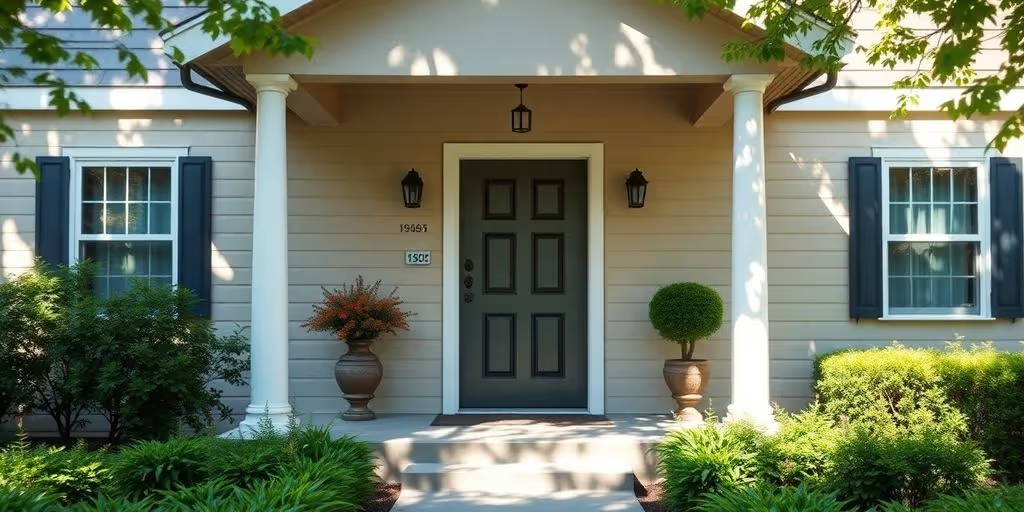Rising Interest Rates and VA Loans: Essential Insights for Today's Home Buyers
November 19, 2025
Explore how rising interest rates impact VA loans and what buyers should know to navigate today's market.

With interest rates on the rise, buying a home can feel like a daunting task, especially for veterans and active military members looking to utilize VA loans. These loans offer unique advantages, but rising rates can complicate things. Understanding how these loans work in a fluctuating market can help buyers make informed decisions and secure their dream homes.
Key Takeaways
- VA loans offer no down payment and no mortgage insurance, making them attractive for buyers.
- Rising interest rates can impact loan eligibility and affordability for buyers, so it's essential to stay informed.
- Getting pre-approved for a VA loan can strengthen your position in a competitive market.
- Sellers may have misconceptions about VA loans; educating them can make your offer more appealing.
- Despite rising rates, the long-term benefits of VA loans, such as lower monthly payments, remain significant.
Understanding VA Loans in a Rising Rate Environment
What Are VA Loans?
VA loans are a mortgage option available to eligible veterans, active-duty service members, and surviving spouses. These loans are guaranteed by the Department of Veterans Affairs (VA), offering significant benefits compared to conventional mortgages. The VA itself doesn't directly lend money; instead, it guarantees a portion of the loan, reducing the risk for private lenders. This guarantee allows lenders to offer more favorable terms to borrowers.
Benefits of VA Loans for Home Buyers
VA loans come with several advantages, making them an attractive option, especially in a rising interest rate environment:
- No down payment is typically required, freeing up funds for other expenses.
- No private mortgage insurance (PMI) is needed, reducing monthly payments.
- Often have more lenient credit score requirements compared to conventional loans.
- Offer competitive interest rates, even as rates rise generally.
VA loans can be a game-changer for eligible home buyers, providing access to homeownership with more manageable costs and flexible terms. Understanding these benefits is the first step in determining if a VA loan is the right choice for you.
How Rising Rates Affect VA Loan Eligibility
Rising interest rates can impact VA loan eligibility in a few key ways. While the VA doesn't set a maximum interest rate, lenders will consider your debt-to-income ratio (DTI) and ability to repay the loan. As rates increase, the monthly mortgage payment also increases, potentially pushing your DTI higher. Lenders will carefully evaluate whether you can comfortably afford the higher payments. It's important to get pre-approved to understand how much you can afford in the current market. Factors that determine VA loan rates include:
- Credit score
- Debt-to-income (DTI) ratio
- Loan amount and duration
Impact of Rising Interest Rates on Home Buying
Current Trends in Interest Rates
Interest rates are always moving, and lately, they've been on the rise. It's not just a feeling; the numbers show it. This increase impacts everything from how much house you can afford to the overall cost of your loan. Keeping an eye on these trends is super important if you're thinking about buying. For example, the factors influencing VA loan rates can be complex and change quickly.
How Rates Influence Home Prices
Rising interest rates can actually cool down the housing market. When rates go up, fewer people can afford to buy, which means there's less demand. Less demand can lead to stagnant or even decreasing home prices. It's a balancing act, though. If there aren't enough homes for sale, prices might not drop as much. It's all connected.
Strategies for Buyers in a High-Rate Market
Buying a home when interest rates are high can feel daunting, but it's not impossible. Here are a few things you can do:
- Shop around for the best rates: Don't just go with the first lender you find. Compare rates and terms from multiple lenders to make sure you're getting the best deal.
- Consider a smaller home or different location: Sometimes, adjusting your expectations can make a big difference. A smaller home or a less expensive area might be more affordable.
- Save a bigger down payment: The more you put down, the less you have to borrow, and the less interest you'll pay over the life of the loan.
It's also a good idea to talk to a financial advisor or a real estate agent. They can help you assess your situation and develop a plan that works for you. Don't be afraid to ask for help; it's a big decision!
Navigating the VA Loan Process

Steps to Secure a VA Loan
Okay, so you're thinking about getting a VA loan? Here's the lowdown on how it usually goes. First, you'll want to figure out if you're actually eligible. This usually means getting your Certificate of Eligibility (COE). Then, you'll want to shop around for a lender. Don't just go with the first one you see! Compare rates and fees. Once you've picked a lender, you'll fill out an application, and they'll start processing your loan. They'll need a bunch of documents from you, so be prepared to gather those. After that, there's the appraisal, and finally, closing!
- Get your COE.
- Find a good lender.
- Complete the application.
Common Pitfalls to Avoid
There are definitely some things to watch out for when you're trying to get a VA loan. One big one is not getting pre-approved. This can really slow things down and make it harder to compete with other buyers. Another mistake is underestimating closing costs. These can add up, so make sure you know what to expect. Also, don't forget about the VA funding fee. It's a percentage of the loan amount, and it can be a significant chunk of change. Finally, be careful about taking on too much debt before you apply. Lenders will look at your debt-to-income ratio, and if it's too high, you might not get approved.
Understanding VA Loan Limits
VA loan limits are something you need to be aware of, but they aren't always a deal-breaker. Loan limits dictate the maximum amount you can borrow without needing a down payment. These limits often match the conforming loan limits set by Fannie Mae and Freddie Mac, but they can vary by county. If you need to borrow more than the limit, you can still get a VA loan, but you might have to put some money down. It's a good idea to check the limits in your area before you start looking at houses, so you know what you can afford.
It's important to remember that even if you're approved for a certain amount, you should only borrow what you can comfortably afford. Consider your monthly expenses, future financial goals, and potential unexpected costs before making a decision.
Enhancing Your Offer as a VA Buyer
Importance of Pre-Approval
Getting pre-approved is a game-changer. It shows sellers you're serious and that a lender has already looked at your finances. In a competitive market, this can make your offer stand out. It's like showing up to a race with your running shoes already on – you're ready to go! Make sure you understand the VA Loan Process before you start.
Making Competitive Offers
It's a tough market out there, but VA buyers can still win. Here's the deal: you might need to be a little creative. Consider offering slightly above the asking price if the situation allows. Also, be flexible with your closing date. Sometimes, giving the seller a little extra time can sweeten the deal. Remember, every little bit helps.
Utilizing Seller Concessions
Seller concessions are a fantastic tool that many VA buyers overlook. Basically, it's when the seller agrees to cover some of your closing costs or other expenses. VA loans allow for pretty generous seller concessions, which can free up your cash for other things, like moving expenses or furniture. It's a win-win!
Seller concessions can be used to pay off credit card bills or buy new appliances. It's a great way to make your offer more attractive without increasing the overall purchase price. Don't be afraid to ask for them!
Addressing Misconceptions About VA Loans

Common Myths About VA Loans
There are a lot of incorrect ideas floating around about VA loans, and it's time to set the record straight. One big one is that VA loans are a hassle for sellers. This isn't really true. Yes, there are inspections, but they're there to protect the buyer. Another myth? That you can't get a VA loan if you don't have perfect credit. While a good credit score helps, it's not the only thing that matters. Lenders look at the whole picture. Don't let these myths scare you away from exploring your options. It's also a myth that VA loans always take longer to close. While it can happen, it's not a given.
The Truth About VA Inspections
VA inspections get a bad rap, but they're actually a good thing. The VA wants to make sure veterans aren't buying homes with serious problems. The inspection is there to protect the buyer from safety issues. It's not about nitpicking every little thing. If issues are found, it gives the buyer a chance to negotiate repairs or back out of the deal. It's about making sure the home is safe, sound, and suitable. These inspections are designed to ensure that veterans are making sound investments. Understanding VA Loan Benefits can help clarify the purpose of these inspections.
Why Sellers Should Consider VA Offers
Sellers might hesitate when they see a VA loan offer, but they really shouldn't. VA buyers are often very qualified and reliable. They've served their country, and they're usually financially stable. Plus, VA loans have a guarantee from the government, which reduces the risk for the lender. Sellers can also benefit from the fact that VA appraisals are often very thorough, which can give them a better understanding of their home's true value. Here's why sellers should give VA offers a serious look:
- VA buyers are pre-screened and qualified.
- The loans are backed by the government.
- VA appraisals can be very detailed.
VA buyers are often highly motivated and committed to buying a home. They've earned this benefit, and sellers should recognize the value they bring to the table. Don't let misconceptions cause you to miss out on a great offer.
Long-Term Benefits of VA Loans
Lower Monthly Payments
One of the biggest long-term advantages of a VA loan is the potential for lower monthly payments. Because VA loans often come with competitive interest rates and don't require private mortgage insurance (PMI), borrowers can save a significant amount of money over the life of the loan. This can free up funds for other financial goals, like retirement savings or investments. It's worth checking out the current VA loan rates to see how much you could save.
No Private Mortgage Insurance
Unlike conventional loans, VA loans don't require private mortgage insurance (PMI). PMI is typically required when a borrower makes a down payment of less than 20% on a conventional loan, and it adds an extra monthly expense. Eliminating PMI can save you hundreds of dollars each month, making homeownership more affordable in the long run. This is a huge advantage, especially for first-time homebuyers or those with limited savings. This absence of PMI is a cornerstone of the VA loan's appeal.
Potential for Loan Assumptions
Another often-overlooked benefit is the potential for loan assumptions. If you decide to sell your home in the future, another eligible veteran may be able to assume your VA loan, potentially at the same interest rate you secured. This can be a major selling point, especially if interest rates have risen since you first obtained the loan. It makes your home more attractive to potential buyers and can expedite the sales process.
VA loans have contributed significantly to the U.S. economy, with one analysis showing a contribution of $3.9 trillion over eight decades. This highlights the broader economic impact of supporting veteran homeownership.
Here's a quick look at some of the long-term financial benefits:
- Lower interest rates compared to some conventional loans.
- No requirement for private mortgage insurance (PMI).
- Potential for loan assumption by another eligible veteran.
- Reduced overall cost of homeownership over the loan's lifetime.
Future Outlook for VA Loans and Interest Rates
Predictions for Interest Rate Trends
Predicting the future is always tricky, but when it comes to interest rates, there are a few things to keep in mind. Many economists think that mortgage rates will probably stay where they are for a while, maybe even through most of 2025. This is based on current economic conditions, like inflation and job growth. Of course, things can change quickly, so it's important to stay informed.
Impact on VA Loan Popularity
VA loans have become increasingly popular, especially among younger homebuyers. In the second quarter, VA loans to Millennials jumped by 9.8% compared to the first quarter, and for Gen Z, they increased by 16%. Rising interest rates could make VA loans even more attractive because they often have lower rates than conventional mortgages. This is because the VA backs a portion of each loan, reducing the risk for lenders. If rates stay high, more people might turn to VA loans to make homeownership more affordable.
Advice for Future Home Buyers
If you're thinking about buying a home in the future, here are a few tips:
- Get pre-approved for a VA loan. This will give you a better idea of what you can afford.
- Shop around for the best interest rate. Rates can change often, sometimes even multiple times a day.
- Consider all your options, including different loan terms and types.
Don't rush into anything. Take your time to research and understand the market. Buying a home is a big decision, so make sure you're prepared.
Also, keep an eye on economic indicators. Things like inflation reports and job numbers can give you clues about where interest rates might be headed. Staying informed will help you make the best decision for your situation.
Final Thoughts on VA Loans in a Rising Rate Environment
As we wrap up, it’s clear that rising interest rates can make things tricky for home buyers, especially those using VA loans. But don’t let that scare you off. VA loans still pack a punch with no down payment and no mortgage insurance, which can help you snag a better deal. Just remember, being informed and prepared is key. Get pre-approved, consider making a small down payment, and don’t shy away from negotiating. Sellers might be more open to VA buyers than you think, especially if you show them you mean business. So, keep your head up and stay proactive in this market. You’ve got what it takes to find your dream home!
Frequently Asked Questions
What is a VA loan?
A VA loan is a mortgage backed by the U.S. Department of Veterans Affairs. It helps veterans, active-duty service members, and some military spouses buy homes without needing a down payment.
What are the benefits of using a VA loan?
VA loans come with many benefits, like no down payment, no private mortgage insurance, and often lower interest rates compared to regular loans.
How do rising interest rates affect VA loans?
When interest rates go up, it can make monthly payments higher. This might make it harder for some buyers to afford homes, but VA loans can still be a good option due to their benefits.
What should I do to prepare for a VA loan application?
To get ready for a VA loan, you should gather your financial documents, check your credit score, and get pre-approved by a lender.
Are there any common misconceptions about VA loans?
Yes! Many people think VA loans are hard to get or that they come with many fees. In reality, they are designed to be helpful and often have fewer costs.
Can I use a VA loan more than once?
Yes, you can use a VA loan multiple times. However, you need to pay off the previous loan or restore your entitlement to use the benefit again.

Alex Chen

Alex Chen













Get in touch with a loan officer
Our dedicated loan officers are here to guide you through every step of the home buying process, ensuring you find the perfect mortgage solution tailored to your needs.
Options
Exercising Options
Selling
Quarterly estimates
Loans
New home

Stay always updated on insightful articles and guides.
Every Monday, you'll get an article or a guide that will help you be more present, focused and productive in your work and personal life.









.png)
.png)
.png)
.avif)
.avif)
.avif)
.png)
.png)
.png)
.avif)
.png)
.png)
.avif)
.png)
.avif)
.png)
.avif)
.avif)